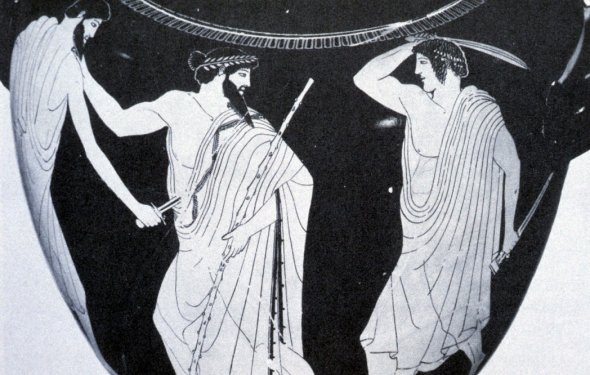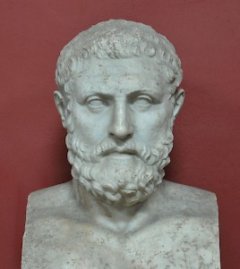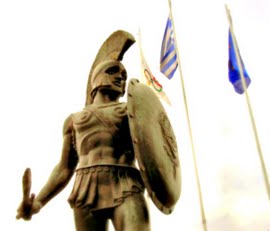Ancient Greece Trojan Horse

 Tyrant:Sole ruler in a Greek city-state, usually an usurper, who held power in defiance of a city's constitution. Originally, the word did not have any negative connotations.
Tyrant:Sole ruler in a Greek city-state, usually an usurper, who held power in defiance of a city's constitution. Originally, the word did not have any negative connotations.
The Greek word tyrannos is probably derived from Lydian tûran, "lord", and simply means "sole ruler". The word is neutral, has associations with wealth and power and can therefore be synonymous with expressions like basileus, "king". For example, the oldest known use of the word tyrannos is a fragment by the poet Archilochos describing king Gyges of Lydia (r.680-644).
Yet, in Greek history the tyrant was usually more than just a monarch. Since the mid-nineteenth century, ancient historians discern two types of tyranny:
- The "older" tyrants in mainland Greece of the seventh and sixth centuries. These people were often dissatisfied aristocrats who managed to seize control of the state by cooperating with the nouveaux riches: wealthy people from non-aristocratic families that had until then usually been excluded from government. Examples are Cypselus and Periander of Corinth, Pittacus of Mytilene, Pisistratus of Athens, and Polycrates of Samos. These tyrannies were a normal phase in Greek history, marking the end of the old aristocracy and the beginning of oligarchic or even democratic rule.
- The "younger" tyrants in the periphery of the Greek world of the late fifth and fourth centuries. These people tried to expand the power of their city-states and were in fact creating larger political units. Example are Jason of Pherae and Agathocles of Syracuse.
Modern scholars tend to add two other types:
- The eastern tyrants. In the sixth to fourth centuries, many city states in Asia Minor were part of the Achaemenid or Persian empire and were ruled by one man (e.g., Aristagoras of Miletus), who served as an intermediary between the city and the great king.
- The western tyrants of the late sixth, early fifth centuries, to be found in Sicily and southern Italy. Using mercenary armies, people like Phalaris of Acragas, Hippocrates of Gela, and Gelon of Syracuse created political units that were larger than the old city-states. In fact, this type is a predecessor of type #2.
The negative connotation of the word originated in fifth-century Athens, where the democrats more or less created the tyrant as their anti-type. Writers like Herodotus of Halicarnassus and Thucydides make it clear that democrats thought that the power of tyrants was uncontrolled, so that they easily became violent and mean despots, surrounded by sycophants. Democracy, in this philosophy, was the exact opposite: people were free to speak and power was controled and balanced.



|
Ancient Greece: Aristotle's 6 Forms of Government - Classroom Poster Office Product (PosterEnvy)
|
|
The Tyranny of Greece over Germany: A Study of the Influence Exercised by Greek Art and Poetry over the Great German Writers of the Eighteenth, Nineteenth and Twentieth Centuries Book (Cambridge University Press) |
 Classical Greece was a 200 year period in Greek culture lasting from the 5th through 4th centuries BC. This classical period had a powerful influence on the Roman Empire and greatly influenced the foundations of the Western Civilization. Much of modern Western politics, artistic thought, such as architecture, scientific thought, literature, and...
Classical Greece was a 200 year period in Greek culture lasting from the 5th through 4th centuries BC. This classical period had a powerful influence on the Roman Empire and greatly influenced the foundations of the Western Civilization. Much of modern Western politics, artistic thought, such as architecture, scientific thought, literature, and...